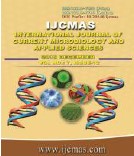


 National Academy of Agricultural Sciences (NAAS)
National Academy of Agricultural Sciences (NAAS)

|
PRINT ISSN : 2319-7692
Online ISSN : 2319-7706 Issues : 12 per year Publisher : Excellent Publishers Email : editorijcmas@gmail.com / submit@ijcmas.com Editor-in-chief: Dr.M.Prakash Index Copernicus ICV 2018: 95.39 NAAS RATING 2020: 5.38 |
Zinc (Zn) is a micronutrient, which is involved in activating many physiological and biochemical processes. Inadequate supply of Zn affects crop growth, development and in turn yields. Most of us depend on agriculture based foods which are grown under inadequate Zn supply and hence we get less of Zn as recommended. A few strategic approaches are being adapted to overcome inadequacy of Zn in food. Biofortification is one of the best strategy to enhance the Zn content in the food grain. Among these, direct fertilizer application to the plant is the easiest way to enhance the Zn content in the food grain. Perhaps, excess use of Zn is not recommended because of heavy metal and di cationic characteristic properties. In this context application of the nano fertilizer enhances efficacy of targeted delivery and nutrient use efficiency. Zn deficiency is more common under conditions of high soil pH. In this regard a study was conducted to understand the efficacy of ZnO nanoparticle synthesised through biological approach under the high soil pH condition. Nano Zn treatment showed higher chlorophyll content, yield and shoot biomass as compared to ZnSO4 treatment. Further there was no significant difference were observed in plant height, number of leaf per plant, leaf area, cob length, number of seeds/row, cob weight and test weight compared to ZnSO4 treatment. Higher leaf Zn was found in the ZnO nano treatment with Seed priming + foliar application. Whereas, seed Zn content was high in biologically synthesized ZnO nanoparticle with seed priming treatment. Overall, the results indicated that the positive effect of nano Zn improved the growth, yield and Zn content under high pH conditions.
 |
 |
 |
 |
 |